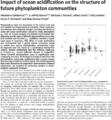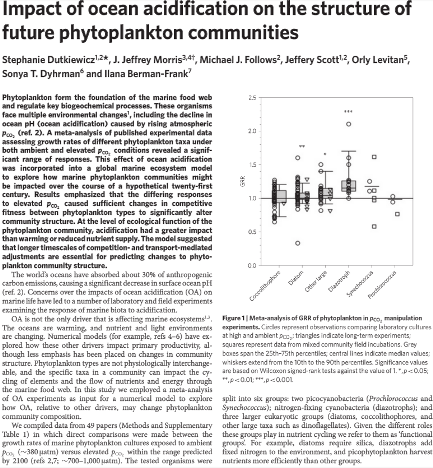File:Phytoplankton Dutkiewicz article avail via 'Nature Climate Change' scientific journal publ.png
Phytoplankton_Dutkiewicz_article_avail_via_'Nature_Climate_Change'_scientific_journal_publ.png (433 × 468 pixels, file size: 159 KB, MIME type: image/png)
Ocean acidification is destroying plankton around the globe
Oceans have absorbed up to 30 percent of human-made carbon dioxide around the world, storing dissolved carbon for hundreds of years. As the uptake of carbon dioxide has increased in the last century, so has the acidity of oceans worldwide
Phytoplankton’s role in the marine food chain is particularly significant.
Phytoplankton, microscopic marine plants, form the foundation of the marine food web and regulate key biogeochemical processes.
In a balanced ecosystem, phytoplankton provide food for a wide range of sea creatures...
Dr. Jeffrey Morris, professor of biology who participated in the study: “Because phytoplankton types are not physiologically interchangeable, changing which species are most common in a community can impact the cycling of elements, the flow of nutrients and energy through the marine food web.”
“The implications could be substantial.”
While phytoplankton are extremely crucial to the marine ecosystem, these organisms face multiple environmental changes, including the decline in ocean pH, also known as ocean acidification, caused by rising atmospheric pCO2.
The world’s oceans have absorbed about 30 percent of fossil fuel carbon emissions caused by human activity, resulting in a significant decrease in surface ocean pH. Concerns over the impacts of ocean acidification on marine life have led to a number of laboratory and field experiments examining the response of marine life to acidification.
More...
Tiny Blue Green
File history
Click on a date/time to view the file as it appeared at that time.
| Date/Time | Thumbnail | Dimensions | User | Comment | |
|---|---|---|---|---|---|
| current | 13:50, 22 July 2015 |  | 433 × 468 (159 KB) | Siterunner (talk | contribs) | Ocean acidification is destroying plankton around the globe Oceans have absorbed up to 30 percent of human-made carbon dioxide around the world, storing dissolved carbon for hundreds of years. As the uptake of carbon dioxide has increased in the last ... |
You cannot overwrite this file.
